How to avoid overcommitting
Intro
Besides my work as an independent consultant and low code developer, I do a lot of community work. I am an active Microsoft MVP, new member of the PnP team, run a blog, am a speaker at conferences, live on Twitter, record podcasts, draw sketchnotes, mentor fellow members of the community and support many initiatives that make tech a welcoming and inclusive space for everyone.
For my (paid) day-to-day job, I exactly know how much time I will spend on work with my customers. I have my due dates and deadlines, organize everything very clearly, and if I see, that I won’t be able to do something in the requested time, I will tell my customer upfront—everything under control.
This does not apply to my community work. Someone will ask me to work together on something, and because I am interested in many things AND get distracted easily, I can lose my focus. This leads to saying ‘yes’ way too often, losing track, and having that feeling of juggling too much at the same time, I found myself drowning in my community activities.
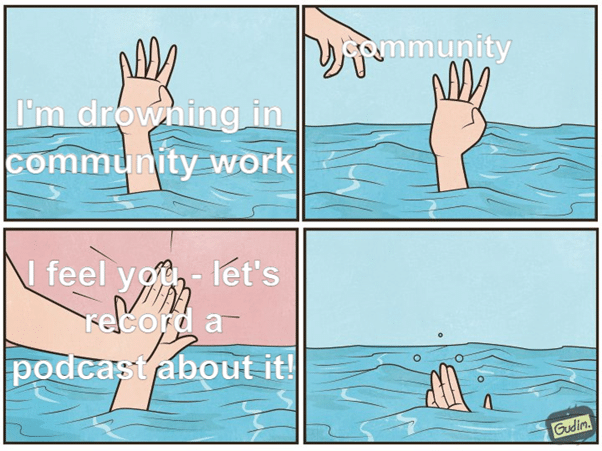
Impact
Overpromising leads to bad quality of results, because you need to work through things in a rush or it damages your reputation because you do not meet the expectations of others. You will also most likely blame yourself and feel bad about it which could lead to a vicious circle of feeling guilty, trying to compensate that with the next commitment and not achieving what you had in mind in the first place. And then you feel bad about feeling guilty. Sigh. We all joke about abandoned side projects and domains we would never put into use, there are even websites on which you can trade abandoned side projects-but in reality, this is just the tip of the iceberg of overcommitment.

Source: https://twitter.com/ThePracticalDev/status/792730113158868993
The core of the problem
So what is overcommitting?
To prepare for this blog post, I googled a bit, and I found two fascinating definitions: Of course, the Merriam-Webster Dictionary gives us an obvious explanation of what is overcommitment, and I will refer to that in this post: obligating yourself beyond the ability of fulfilment.
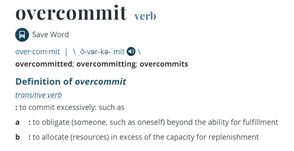
Source: https://www.merriam-webster.com/dictionary/overcommit>
But as I work in tech, ‘Memory overcommitment’ came to my mind as well: It is a concept that allows a virtual machine to use more memory space than the physical host has available. And this made me think: ‘Do we try to act like VMs, which can just use MORE memory space than it has allocated?’ If you still read this, then chances are high, that you will answer this question with a ‘yes’.
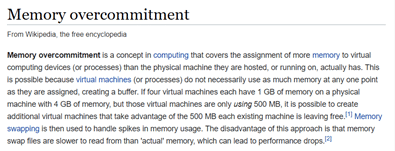
Source: Memory overcommitment – Wikipedia
Although we know that we only have limited capacity to work on things, process information and focus to on spend on, we try to behave like machines to make still it happen. We cut on sleep, to even make it work, which won’t lead to a better outcome. We lose overview about the things we want to do, or we promised to do. And if we suffer too much, we will question ourselves, why we cause so much stress and what we could do about that. And then we read something like ‘learn to say “no”‘. But that is easier said than done, because it is only curing the symptoms, but doesn’t go to the root of the cause.
Systemic thinking.
If we approach that with systematic thinking, we can have a more in-depth look on that: We will be able to see several levels
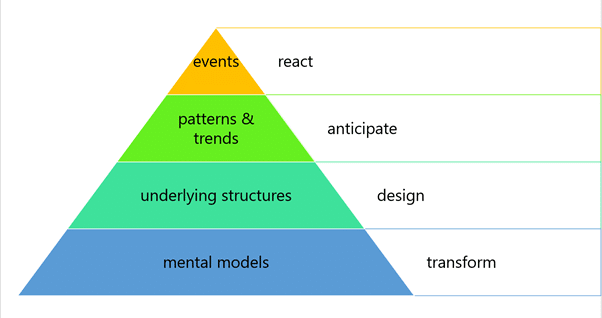
- React
we only focus on the events, that happen, like ‘I am catching a cold’ or even ‘I feel stressed’. This top-level is visible to us and noticeable to others very quickly. It is how we react to circumstances and decisions.
- Anticipate
The layer underneath those events would be anticipating and reviewing patterns and trends, like ‘I’ve been catching a cold more often when sleeping less’ or ‘I felt more often stressed when I lost the overview of what I already committed to’. We now make a guess, that if we sleep less, this will lead to getting sick more likely, we anticipate, that no overview will result in stress.
- Design
If we still want to go a level deeper, we will seek the underlying structures of the patterns we identified in the last level like ‘what has influenced the patterns?’ And ‘how are the patterns interwoven’, ‘what does their relationship look like?’. In our cases, this could lead to considerations like ‘more stress, lack of healthy food, challenging times led to a lack of sleep which resulted in catching colds more easily’ and ‘saying automatically “yes” to all kinds of community activity without checking your availability, mental load and capacity or even energy and focus on achieving things, will make you feel stressed more likely’.
- Transform
Our final level will be the mental models that sit underneath and support the structures described in level 3. Which assumptions, beliefs and values do people hold to keep this system in place where you feel forced to behave in a certain way? In our examples, it would be ‘career is the most important thing, even a higher priority than getting enough sleep to stay healthy’ and ‘the more you contribute (and not say ‘no’ to an opportunity), the more you are valuable to the community’.
How does the model now work in our case?
The mental model of ‘the more you contribute, the more valuable you are’ (intensified by the fear of losing your MVP status or losing credibility as a leader) will lead to feel a constant pressure of creating content, getting involved and seeking for opportunities. And although we all love to do community work and strongly believe in the sharing is caring statement, chances are high, that we at some point overcommit. And as you are STILL reading this article, it’s very likely, that you found yourself overcommitting as well.
Approaches to solve this
If we only work on the first (few) levels, we are just scratching the surface, which means that we won’t sustainably solve. Of course we could cure some symptoms like ‘taking some more vitamins against catching a cold’ or ‘booking a massage against feeling stressed’, but this isn’t a solution as it doesn’t work sustainably. We will very likely still catch colds because of a lack of sleep or feel stressed because of unhealthy working ethics.
Learning to say no?
If you strongly believe in ‘the more you do, the more value you add’, you will not learn to say ‘no’. Of course, you will neglect some asks after you decided to ‘learn to say “no”‘, but very soon you will return to your old patterns – because you didn’t change the mental model. And yes, it is tempting to fulfil asks – because it means, you count. And your work is valuable. YOU have been asked.
Food for thought
Let’s reverse the model that led to unhealthy community work ethics:
Mental model
What if ‘less is more’ is true in this case? What if focusing on some things rather than trying to be everywhere would be the key for you? Think again about what you wanted to achieve with community work: being recognized for helping others? In that case, specialization and scaling could be a good idea:
Structure
Sharpen your profile to be the expert and master of a few things instead of being the Jack of all Trades. This will also condense your brand and will lead to let you work in the community on your sweet spot. You will still have more than enough opportunity to grow and extend your comfort zone.
Trends and patterns
If you change your mind towards the Marie Kondo method ‘If it doesn’t spark joy, toss it’, you will surely adapt to be more selective of your commitments and be more likely only to commit if you mean it because you analyzed impact, costs and investments.
Events
This will lead to you not overcommitting again, because you solved the issue at its root and didn’t just care about a symptoms.
But what if you now know about the impact of your mental model but still need to deal with your previous choices? How can we gain control over our own desire to be recognized as a helpful leader?
Visualization
A good starting point to regain control and to be aware of what you already committed to, and which activities depend on other activities and how everything is interwoven would be visualizing everything. You could make a list; I chose to put all my commitments (the things I promised and the things I want to do, all my rough ideas, that I want to elaborate on) in a Microsoft Planner board. The tool itself doesn’t matter, make sure that you make everything visible. Collecting everything from different lists, conversations, notebooks, whiteboards etc. could take some time, but it is worth it. When I did that, I felt a bit scared, how much was going on in my mind (and task lists) and how heavy my mental load was.

Clarify Impact
Now that you pulled out everything, it’s a good time to think about the impact each task (in my case, it was a card) has. Determine the effect of DOING the thing and of NOT doing it for you and community. What happens community-wise, if you don’t write THAT blogpost? If you don’t participate in THAT tweet jam or if you won’t co-organize THAT conference? Probably, you will allow someone else to do it. Now think about what happens to you, if you skip that task: Will you still be a valuable member of the community? Of course? Will you improve because of caring for yourself and better mental health? Sure!
Pick one thing that is very close to your heart
As we do not only make reasonable decisions, but are of course emotionally involved, it is now a good idea to pick one thing, that you are passionate about. This is your ‘feel good commitment’.
Estimate your costs
Try to estimate now, how much time you need to invest for each commitment and compare the desired outcome (support others, solidifying your knowledge, proving you are a valuable member of community/thought leader) with the actual impact of not doing it and the time you will need to spend on it.
make decisions
Little impact but colossal investment? Please don’t do it. Conflicts with your values of family, self-care, being thoughtful, inclusive etc.? Please don’t do it.
Better choices
To make better decisions for the future, I collected some things that I started to do, which could be helpful for you as well:
Everything needs to be on the board of commitments
Have your list/board/visualization at hand. Whenever you get asked ‘can you do x’ or ‘would you like to collaborate with me on y’ and even if you think ‘I should blog/vlog about z’, have a look on your board of commitments and oblige yourself to put everything on it. Sometimes, already this will lead to saying ‘no’ or putting that on your backlog. But watch out that your backlog doesn’t grow to a pile of guilt.
No last minutes
Don’t commit to last-minute duties. Consider to check your calendar. If it looks like this, don’t do it!
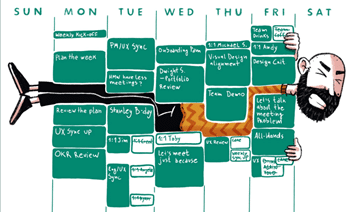
Source: https://twitter.com/DugarToGo/status/1333676357512028163?s=20
Don’t say yes immediately, think about: costs, impact and consequences, if you don’t do it. Then decide without pressure. This will even sound reasonable, if you tell: ‘I feel honoured /flattered/appreciated to be asked, but I first want to consider, if I can deliver that in a given quality without getting into trouble. I will get back to you on Monday.’
Even small commitments add up!
Even if you think, that a commitment is just a tiny thing: Consider your mental load and that you can focus only on a few things.
Follow the process
Make it easier to follow your process of balancing mental load and commitments than working around it. Have your board/list at hand and write down everything. Also put your estimated time investment plus impact on the card/into the list and separate ‘having an idea’ or ‘being invited to collaborate on an idea’ from ‘deciding actually to do that and commit to it’. Once you committed, think about a due date. Check your calendar and block the time dedicated to this thing. If you don’t find a free slot, (not extending your working hours to work nightshifts, too) consider to do it later (change the due date) or not at all. Then put the card into your backlog (if it is still a good idea for you) or sponsor someone else in the community with a good idea. #SharingIsCaring
Feedback and what’s next?
What do you think? What helped you to be aware of overcommitting and how did you stop to do that? Would love to host a panel discussion around that – what’s on your mind?
You May Also Like
Please don’t “hello” me! Why “hello” in Microsoft Teams isn’t polite!
I recently stumbled over nohello.com and aka.ms/nohello, which refers to https://github.com/sbmueller/nohello/blob/master/index.md#please-dont-say-just-hello-in-chat by https://sbmueller.github.io/. …
Lego & Community – Interviews about building and learning
After some blog posts about Power Apps and my personal Microsoft Graph challenge, I am excited to announce that I will run a Community interview series about Lego. I noticed that there are a lot of …
2019 or How I started to believe in myself
Purpose of this post Someone on twitter asked, what was the one word to describe 2019. As I can’t name just one word, I will need to write an entire blog post to do that. Originally, I didn’t know if …





